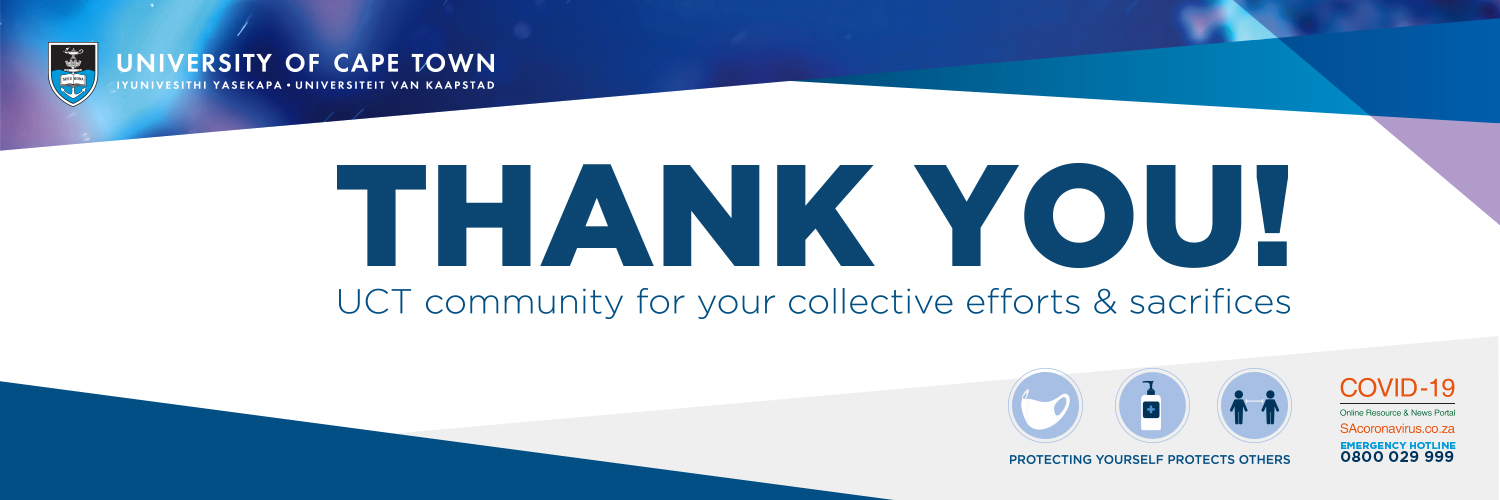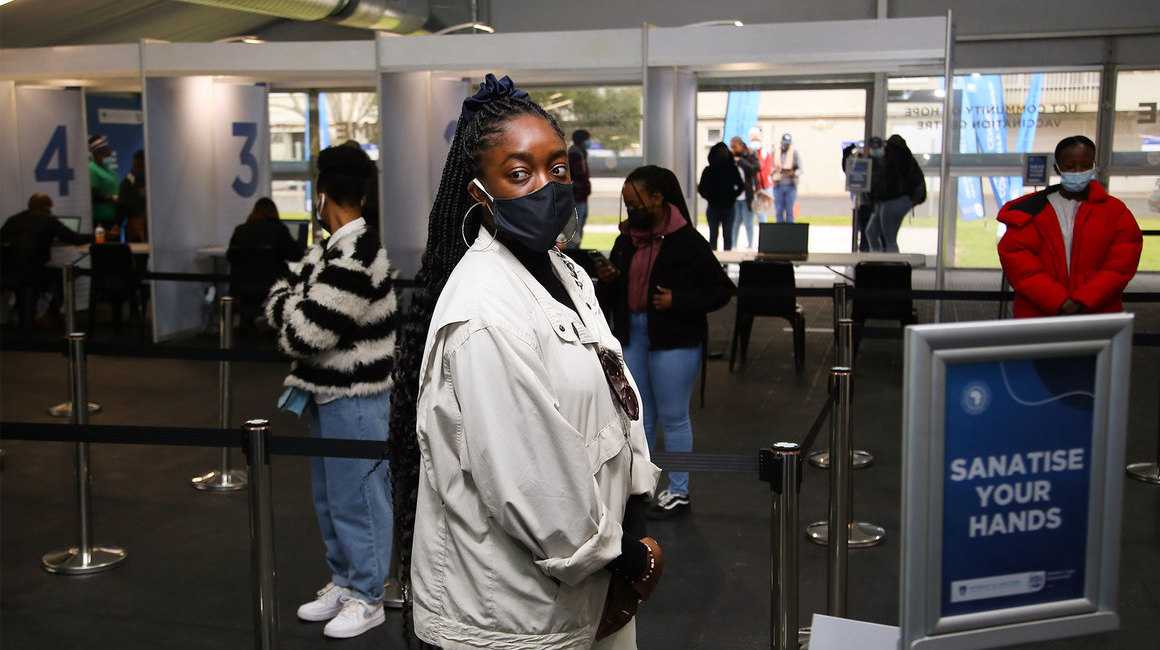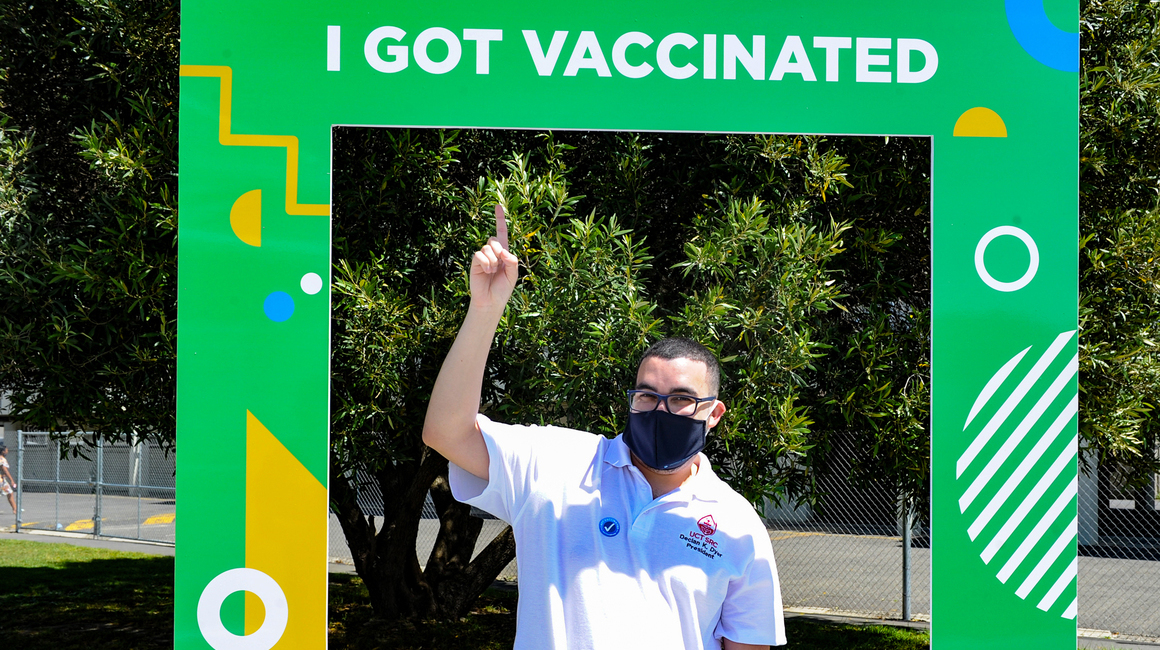UCT, Western Cape Government to launch Community of Hope Vaccination Centre
27 August 2021 | Story Niémah Davids. Photos Je’nine May. Read time 3 min.The University of Cape Town’s (UCT) Forest Hill residence was recently a hive of activity as the first steps towards building the on‑campus UCT Community of Hope Vaccination Centre were set in motion. Construction workers were hard at work on the residence’s lawns, setting up a giant steel frame in preparation for the 800 m2 marquee which will serve as the vaccination centre.
Plans to establish the centre form part of a joint initiative between UCT and the Western Cape Department of Health (DoH). Having a vaccination centre on campus means that eligible UCT staff and students will be able to receive their vaccinations easily. However, use of the site is not limited to the campus community; the doors are also open for anyone who meets government’s vaccination‑eligibility criteria.
While UCT has provided the physical facility for the site (located on Main Road in Mowbray), the centre will be managed exclusively by the DoH. The department will also provide the daily vaccine doses, as well as staffing solutions (medical, administrative, cleaning and security) to manage the site.
Nearing completion
Both Carin Brown, UCT lead architect responsible for design and layout of the vaccination centre, and Lukhanyo Binqela, the UCT COVID‑19 vaccination facility infrastructure project manager, have been instrumental in designing and managing the project since inception. Binqela said phase one of the project had kicked off on Monday, 12 July 2021, after students concluded their exams. And with the help of UCT’s Properties and Services department (P&S), the Department of Student Affairs and an independent contractor, the project is now nearing completion.

Once completed, Binqela said, the centre will boast 12 vaccination stations and five patient check‑in points. Entrance and exit points will be strategically located at the tail-end of the residence, and a limited number of parking bays will also be made available in exceptional cases. Provision is also being made for wheelchair users and visually impaired visitors.
The site plan was mapped out with Forest Hill residents in mind, so as not to disturb or disadvantage them while vaccinations are under way. Day‑to‑day operations at the residence will also continue as normal.
Paying it forward
UCT Vice‑Chancellor Professor Mamokgethi Phakeng said the university provided the grounds on which to erect the centre as a means of giving back to the local community.
Professor Phakeng said the vaccination centre demonstrates three things: first, that UCT belongs to the wider Cape Town community; second, that it requires a collective effort to reduce the threat and spread of COVID‑19 at community level; and third, that this is yet another tangible project highlighting UCT’s commitment to being socially responsive.

She commended the UCT Joint Implementation Team, led by Emeritus Associate Professor David Coetzee and his team members – Kirshni Naidoo, the director of Occupational Health and Safety Division within P&S; Dr Tracey Naledi, the deputy dean of Health Services in the Faculty of Health Sciences; and Dr Reno Morar, UCT’s chief operating officer – for their hard work in getting the project off the ground.
Dr Keith Cloete, head of the DoH, said the UCT Community of Hope Vaccination Centre project once again highlighted the department’s “philosophy of partnership”. Throughout the pandemic, the DoH has partnered with various sectors, including higher education institutions.
“Working together with partners enables us to do so much more, reach so many more people with the ultimate goal in mind: to ensure we reach maximum uptake among our communities.
“With the over-18s now also eligible to be vaccinated, the timing is perfect, and this site is ideally situated to be accessible to the students, similarly at the other universities where we have vaccination sites,” said Dr Cloete.
He thanked his DoH colleagues and the UCT team for bringing this initiative to life “as it will only put us in good stead over the next few months, as we move towards vaccinating as many people as possible”. This, he said, will in turn lead to a reduced impact on the health system as there will be fewer people requiring hospitalisation due to COVID‑19 infection.
The centre should be completed and operating by 1 September 2021.
 This work is licensed under a Creative Commons Attribution-NoDerivatives 4.0 International License.
This work is licensed under a Creative Commons Attribution-NoDerivatives 4.0 International License.
Please view the republishing articles page for more information.
UCT’s response to COVID-19 in 2021
COVID-19 is a global pandemic that caused President Cyril Ramaphosa to declare a national disaster in South Africa on 15 March 2020 and to implement a national lockdown from 26 March 2020.
UCT is taking the threat of infection in our university community extremely seriously, and this page will be updated regularly with the latest COVID-19 information. Please note that the information on this page is subject to change depending on current lockdown regulations.

Global Citizen Asks: Are COVID-19 Vaccines Safe & Effective?
UCT’s Institute of Infectious Disease and Molecular Medicine (IDM) collaborated with Global Citizen, speaking to trusted experts to dispel vaccine misinformation.
If you have further questions about the COVID-19 vaccine check out the FAQ produced by the Desmond Tutu Health Foundation (DTHF). The DTHF has developed a dedicated chat function where you can ask your vaccine-related questions on the bottom right hand corner of the website.
IDM YouTube channel | IDM website
UCT Community of Hope Vaccination Centre
The University of Cape Town in partnership with the Western Cape Government (WCG) have reinforced our commitment to bringing hope to the residents of the Mother City with the launch of the world‑class Community of Hope Vaccination Centre that opened its doors on Monday, 30 August 2021.
The site is located on Main Road in Mowbray – in the Forest Hill Residence – and access is from Broad Street. The site is open every Monday to Friday from 08:00 to 15:00 and on Saturday from 09:00 to 13:00. Please allow time for attending to COVID-19 protocols and arrive as early as possible at the vaccination centre.
Frequently asked questions
News and views
Campus communications
2021
Media releases
Read more
UCT statements related to COVID-19 vaccinations
This is a space created for all formal bodies and structures within the university community to share their opinions on the need for a mandatory COVID-19 vaccine policy. Please note that some editorial judgement may be applied if the received statements go against any constitutional rights, and that no correspondence will be entered into, statements will be posted unedited and as received. Statements can be sent to opinions@uct.ac.za.
Commemorating a year of COVID-19
At midnight on 26 March 2020, South Africa went into the first nationwide hard lockdown. A year later, we remember those who have died and those who have been affected by COVID-19, as well as the pandemic’s effects across society and campus. We are especially grateful for the front-line health workers who have done so much for so many.
#UCTCOVIDPledge – social media elements
Customised Facebook frames and Instagram stickers are now available on those social media platforms. Watch the tutorial videos here to see how easily you can show your support for the #UCTCOVIDPledge.
In an email to the UCT community, Vice-Chancellor Professor Mamokgethi Phakeng said:
“COVID-19, caused by the virus SARS-CoV-2, is a rapidly changing epidemic. [...] Information [...] will be updated as and when new information becomes available.”
We are continuing to monitor the situation and we will be updating the UCT community regularly – as and when there are further updates. If you are concerned or need more information, students can contact the Student Wellness Service on 021 650 5620 or 021 650 1271 (after hours), while staff can contact 021 650 5685.













































































